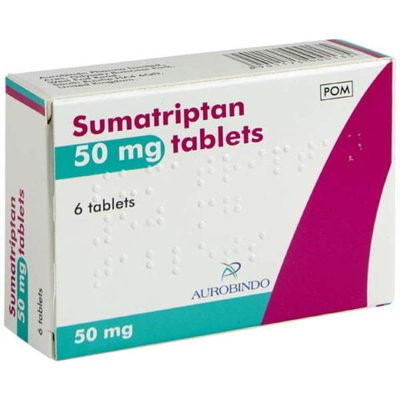Today, roughly 6 million people suffer from migraine in the United Kingdom. In England alone, a study by the National Institute for Health and Clinical Excellence (NICE) shows that roughly 190,000 patients experience migraine attacks. While migraine symptoms are usually severe, it’s very rare for this disease to lead to death. Instead, untreated episodic migraine can always become chronic. To avoid chronic migraine attacks, one effective treatment option you can rely on is migraine tablets, such as Sumatriptan and Zolmitriptan.
Although Sumatriptan 50 mg and Zolmitriptan tablets are two effective medicines that work almost the same way, they also have their differences. Read on to discover the differences between these migraine tablets and how to pick a suitable one.
What exactly is Sumatriptan 50 mg tablet?
Sumatriptan falls under the class of migraine drugs, known as selective serotonin receptor agonists. These medicines work by helping to narrow the blood vessels in the head. This blood-narrowing process is effective in preventing pain signals from being sent to your brain.
Here’s a commonly asked question, Do Sulmatriptan migraine tablets work? The simple answer is yes, these medicines are very much effective for migraine treatment. Below are a few illustrations to better explain how Sumatriptan works:
- As you already know, this medicine for migraine belongs to a class of drugs known as a selective serotonin receptor agonist or triptan. The work is pretty simple; as you use this migraine tablet, it’ll react by binding to serotonin 5-HT1B/1D receptors.
- This binding process is effective for hampering any pro-inflammatory substances. This further results in the narrowing of your head’s blood vessels.
- Furthermore, the tightness of the cranial blood vessels helps to control the pain signals, stopping them from getting to your brain.
What exactly is a Zolmitriptan tablet?
Zolmitriptan is the generic name for most brands, such as Zomig. Like Sumatriptan migraine tablets, this drug also belongs to the triptan family, which is also known as a selective serotonin receptor agonist of both the 1B and 1D subtypes.
Zolmitriptan also works by tightening the blood vessels in your head. This process helps to prevent pain signals from having any effect on your brain. Furthermore, this process also helps to block the release of various substances that cause different migraine symptoms, such as nausea and pain.
Sumatriptan vs Zolmitriptan: Do they have side effects?
As with many drugs out there, both sumatriptan and zolmitriptan have side effects. Some of these effects are inevitable if you end up misusing these medicines.
Below are a few side effects of Sumatriptan:
- As long as you don’t have any pre-existing medical condition, you’ll only experience mild side effects, such as nausea, vomiting, general body weakness, bad taste, dizziness, nosebleeds, and throat heaviness.
- Sumatriptan overdose is not advised, as it often leads to more serious side effects, such as tremors, seizures, breathing issues, loss of coordination, and vision issues.
- If you have heart or blood vessel disease, you need to keep your doctor aware before using Sumatriptan 50 mg. This migraine tablet can cause further complications to your disease. It can trigger a heart attack or even worsen coronary artery disease. Irregular heart rhythm is also a common side effect.
Below are a few side effects of zolmitriptan:
- Mild side effects of Zolmitriptan include drowsiness, swallowing difficulty, chest pain, tightness of the neck/chest, and a burning sensation. These effects are more common if you take Zolmitriptan migraine tablets.
- Some rare side effects of zolmitriptan include weakness, puffiness, severe abdominal or stomach pain, diarrhoea, irregular heartbeat, nausea, facial skin colour changes, hoarseness, fever, skin rash, lack of appetite and painful urination.
Sumatriptan vs Zolmitriptan: drug interactions
Both Sumatriptan 50 mg and Zolmitriptan migraine tablets can easily react with certain drugs, which will render them less effective.
- For instance, you shouldn’t combine these drugs. Furthermore, if you’ve taken any triptan migraine medication in the past 24 hours, you should stay away from using Sumatriptan or Zolmitriptan.
- If you have had any MAO inhibitor or tranylcypromine in your body system in the past 2 weeks, you certainly need to stay away from taking zolmitriptan and sumatriptan migraine tablets. Doing this will most certainly lead to fatal health conditions.
- Nonsteroidal anti-inflammatory medicines, such as Ibuprofen, paracetamol, and aspirin-containing painkillers can go well with Sumatriptan without any interaction.

